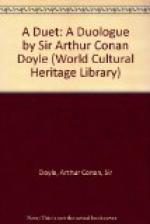In the base of the statue is an iron door, which has been thrown open, and the sculptor’s art has succeeded wonderfully in convincing you that it has been thrown open violently. The two leaves of it seem still to quiver with the shock, and one could imagine that one heard the harsh clang of the metal. Out of the black opening had sprung a dreadful thing, something muffled in a winding-sheet, one bony hand clutching the edge of the pedestal, the other upraised to hurl a dart at the woman above him. She, a young bride of twenty-seven, has fallen fainting, while her husband, with horror in his face, is springing forward, his hand outstretched, to get between his wife and her loathsome assailant.
‘I shall dream of this,’ said Maude. She had turned pale, as many a woman has before this monument.
‘It is awful!’ Frank walked backwards, unable to take his eyes from it. ’What pluck that sculptor had! It is an effect which must be either ludicrous or great, and he has made it great.’
‘Roubillac is his name,’ said Maude, reading it from the pedestal.
’A Frenchman, or a man of French descent. Isn’t that characteristic! In the whole great Abbey the one monument which has impressed us with its genius and imagination is by a foreigner. We haven’t got it in us. We are too much afraid of letting ourselves go and of giving ourselves away. We are heavy-handed and heavy-minded.’
’If we can’t produce the monuments, we can produce the men who deserve them,’ said Maude, and Frank wrote the aphorism down upon his shirt-cuff.
‘We are too severe both in sculpture and architecture,’ said he. ’More fancy and vigour in our sculptors, more use of gold and more ornament in our architects—that is what we want. But I think it is past praying for. It would be better to subdivide the work of the world, according to the capacity of the different nations. Let Italy and France embellish us. We might do something in exchange—organise the French colonies, perhaps, or the Italian exchequer. That is our legitimate work, but we will never do anything at the other.’
The guide had already reached the end of his round, an iron gate corresponding to that by which they had entered, and they found him waiting impatiently and swinging his keys. But Maude’s smile and word of thanks as she passed him brought content into his face once more. A ray of living sunshine is welcome to the man who spends his days among the tombs.
They walked down the North Transept and out through Solomon’s Porch. The rain-cloud had swept over, and the summer sun was shining upon the wet streets, turning them all to gold. This might have been that fabled London of which young Whittington dreamed. In front of them lay the lawns of vivid green, with the sunlit raindrops gleaming upon the grass. The air was full of the chirping of the sparrows. Across their vision, from the end of Whitehall to Victoria Street, the black ribbon




